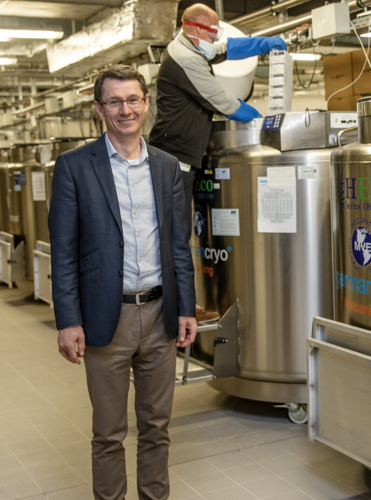To fight a disease effectively, all details must be clearly understood. This is also the case for treating COVID-19. Up to now, doctors have been unable to explain why the course of disease in some patients is difficult, whilst others display no symptoms at all, and what role the immune system plays in this. To investigate this, Hannover Medical School (MHH) in cooperation with the Klinikum Region Hannover (KRH) will establish a COVID-19 cohort over the next two years.
In the Study Centre at the Department of Pulmonary and Infectious Diseases at the MHH, Dr. Isabell Pink is dealing with the collection of the various biosamples and data from COVID-19 patients who are being treated in hospital. Dr. Pink is a doctor working within the research network of the German Center for Lung Research (DZL) at the Hannover site, BREATH, which in cooperation with the German Center for Infection Research (DZIF) is currently involved in a number of research projects dealing with the clarification and combat of the spread of the Coronavirus SARS-CoV-2.
The data and samples collected from the COVID-19 patients will be stored in the Hannover Unified Biobank (HUB) at the MHH and compared with a control group of patients with other pulmonary diseases from the MHH and the KRH. The Lower Saxony Ministry of Science and Culture (MWK) is supporting this project with a grant of over 2 million Euros. The HUB has been a part of the Biobanking Platform of the DZL since 2012. Today, more than 200.000 samples from the DZL are stored here, for use by the scientists for research into various pulmonary diseases.
High safety requirements for the biosamples
„We have already started to collect blood cells, plasma, saliva, urine and cells from the respiratory tract of COVID-19 patients and already also received numberous requests for molecular analyses from the researchers at DZL and DZIF“, says Professor Dr. Thomas Illig, Head of HUB and also a BREATH scientist. „HUB fulfils the high safety requirements for processing and storing the biosamples“, he emphasizes. These requirements also apply to the processing of living blood cells.
Does a mixture of several factors influence the course of disease?
The analyses of the biosamples, together with accurate data on the individual patients, such as age, sex, disease progression, laboratory results, medication intake or nicotine consumption should help to solve the mystery surrounding COVID-19. The data should give some insight into the role played by genes, the immune system, but also pre-existing conditions such as diabetes, asthma, kidney damage or high blood pressure, in the course of a SARS-CoV-2 infection, what long-term damage to the lung and other organs can be caused by the virus and how the treatment of COVID-19 patients can be improved. The scientists
presume that a mixture of the overreacting immune system, individual genetic material and metabolic processes is responsible for the highly variable degrees of severity.
Text: MHH, BREATH/AB
Photo: MHH/ Kaiser

Prof. Dr. Thomas Illig, Head of Hanover Unified Biobank (HUB)